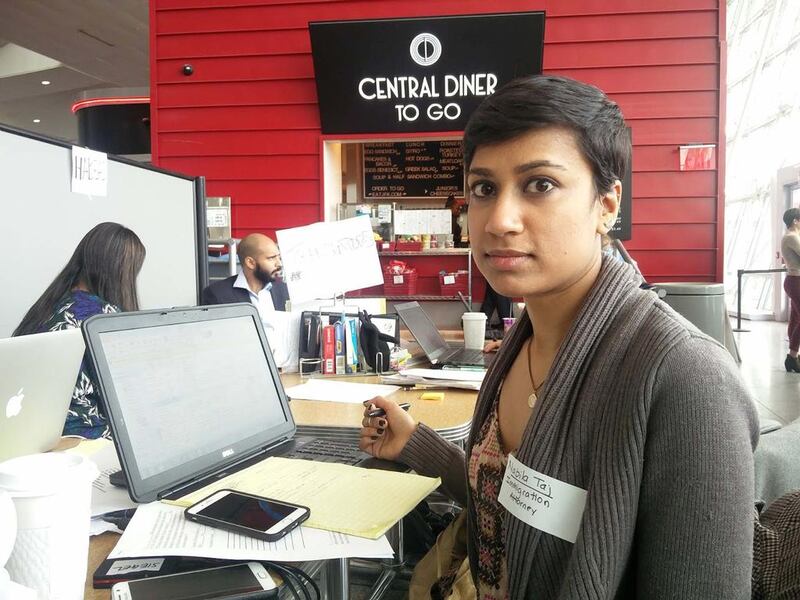NEW YORK // A week after Donald Trump suspended the entry of visitors from seven mainly Muslim nations, volunteer lawyers working at New York’s Kennedy airport say arrivals still face hours of questioning before being allowed into the country.
Campaigners say the president’s executive order is still causing confusion among travellers despite a string of legal victories allowing green card holders and those with residence visas from these countries to re-enter the United States.
Mr Trump faces more difficulties over his controversial policy after a federal watchdog said it would review how it was implemented, in response to a string of complaints and a request from congress.
“A lot of people are being prevented from boarding their flights and coming to the US, so the problem has shifted overseas in some ways,” said Nabila Taj, an immigration lawyer at a 24-hour emergency legal centre set up at John F Kennedy International Airport’s terminal four.
But those who are allowed to travel are facing problems upon arrival in the US, she said.
__________________________________
Trump’s America
■ US travel ban bemuses and angers soldiers battling ISIL in Mosul
_________________________________
Ms Taj said green card holders from the seven countries covered by the ban – Iran, Iraq, Syria, Libya, Sudan, Somalia and Yemen – as well as Muslims from other countries were being pulled out of immigration queues for what is known as secondary screening.
“They are being asked about their trips, their family here, why they are coming in. But they are also being asked about what they think of Donald Trump or what they think of the government here,” she added.
“They (immigration officers) are going through social media accounts, things that go way beyond their immigration status.”
Ms Taj cited the example of one traveller who was found to have a Facebook photograph of a friend with their finger in the air – a gesture resembling the sign used by supporters of ISIL.
“Our concern is what this information might be used for later down the line,” she said.
The volunteer lawyers have been helping people like an Algerian green card holder, who had no one to meet him at the airport after being held for seven hours despite not coming from one of the seven countries. American citizens have also been caught up in the restrictions, said Ms Taj.
She said it was all part of a trend that began after the September 11 attacks, with an entire community singled out for scrutiny.
“They’re creating an intimidating environment where they’re blaming an entire population for individual acts,” Ms Taj said.
Nearby, dozens of her colleagues tapped away at laptops or answered telephones at the Central Diner outlet that has become the base for the volunteer operation. They were dealing with queries from people overseas wanting advice on whether their visas were still valid, and from people trying to get information on relatives who had not yet emerged from the arrivals hall.
Ms Taj said the lawyers would stay as long as they were needed.
“The beautiful thing in all this horror is the way that everyone has come together, and that just shows how unjust this all is,” she said.
The Trump administration is facing a string of legal challenges brought by activists trying to overturn his travel ban and by individuals with valid residence visas trying to return home to the US from overseas.
A federal judge in Los Angeles on Tuesday ruled that immigrants with initial clearance for legal residency must be allowed to enter the US despite the ban.
Among the victories was the case of Dr Amer Al Homssi, 24, a resident of internal medicine at Advocate Christ Medical Centre in Oak Lawn, a suburb of Chicago.
As a Syrian citizen he was originally told he could not travel back to the US and must wait in the UAE – where he had travelled to get married – for 90 days for the travel suspension to end, according to his legal complaint.
But without his job in the US, his lawyer said he feared being sent back to war-torn Syria, a country he left at the age of 17.
"All of these dreadful consequences ... are the result of his being a member of the Muslim faith that is now being treated differently in the United States in stark violation of the First Amendment," said the complaint, according to The Chicago Tribune.
He was reported by the New Yorker to have boarded a flight on Wednesday and to be on his way to Chicago.
The White House has insisted the executive order does not constitute a Muslim ban and says a tightening of entry requirements is essential for national security.
On Sunday, the Department of Homeland Security said green card holders would be allowed on US-bound planes and assessed upon arrival, after revised guidance from the White House said they did not need a waiver to enter the US.
However, the flood of complaints from US residents, many of them professionals, with valid visas has prompted a federal review of the policy.
“The review is being initiated in response to congressional request and whistle-blower and hotline complaints,” said John Roth, the inspector general of the department.
Protests against the travel policy continue, with Yemeni-owned restaurants and bodegas – local grocery stores – in New York saying they would shut shop on Thursday afternoon.
foreign.desk@thenational.ae





